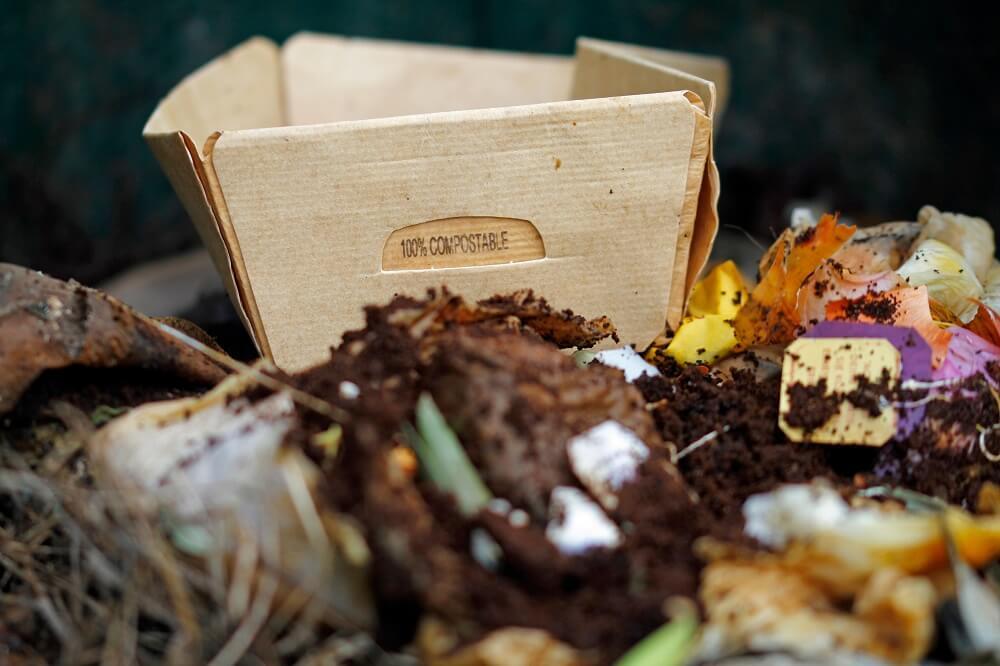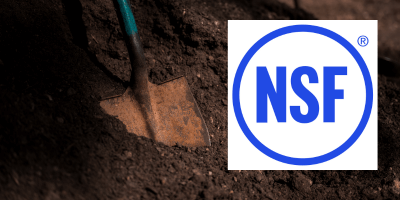In this article, we'll cover:
- What Is NSF Compostability Certification?
- What Does NSF Compostability Certification Cover?
- What Does “No Intentionally Added PFAS” Mean in Compostable Packaging?
- Why NSF Compostability Certification Matters for Manufacturers
- Why NSF Certification Matters for Consumers
- NSF Compostable versus BPI
- What Is The Future of Compostable Certifications?
- Conclusion
What Is NSF Compostability Certification?
NSF compostability certification verifies that packaging materials break down safely in commercial composting environments without releasing harmful substances. Certified products are tested for biodegradation, impact on compost quality, and chemical safety, including verification that no intentionally added PFAS are present.
What Does NSF Compostability Certification Cover?
The NSF certification process involves a thorough, science-based evaluation of how the product interacts with commercial composting systems. Each material undergoes rigorous testing to ensure it is safe for the environment. The testing means that the product won’t release harmful chemicals, heavy metals, or microplastics during decomposition.
The testing also measures the biodegradation rate. Tracking how quickly the product breaks down under controlled composting conditions to ensure it aligns with industrial composting timelines.
Beyond decomposition, NSF evaluates the material's impact on compost quality. Examining factors like nutrient balance, pH, and texture of the finished compost. This ensures that it supports healthy soil and plant growth.
In some cases, multiple stress tests simulate real-world variations. This includes changes in temperature, moisture, and microbial activity to confirm consistent performance.
This comprehensive testing ensures that every certified product not only meets sustainability claims but also contributes positively to commercial composting systems. This gives businesses and consumers confidence that their choices are genuinely eco-friendly.

What Does “No Intentionally Added PFAS” Mean in Compostable Packaging?
In addition to verifying compostability, NSF’s certification includes a "No Intentionally Added PFAS" verification, addressing growing concerns over per- and polyfluoroalkyl substances (PFAS).
These so-called "forever chemicals" are commonly used in coatings to make packaging resistant to grease, water, and stains. They are highly persistent in the environment and can accumulate in soil, water, and living organisms. This poses serious health and ecological risks.
The NSF Verification Process ensures that certified compostable products do not contain intentionally added PFAS. This provides an extra layer of safety for both commercial composting systems and the ecosystems that rely on them.
Through careful material review, chemical testing, and compliance checks, NSF confirms that products meet rigorous compostability standards without introducing harmful, long-lasting chemicals. This verification gives businesses a credible way to market truly safe, sustainable packaging. Consumers can then have confidence that their choices support environmental and human health.
Why NSF Compostability Certification Matters for Manufacturers
NSF compostability certification gives manufacturers a credible, third-party way to validate sustainability claims and stand out in a competitive market. Certification confirms that NSF-compliant compostable packaging meets rigorous requirements for material safety, compostability performance, and regulatory compliance, including verification that no intentionally added PFAS are present.
Certifying products as NSF compostable also helps build brand trust. Consumers are demonstrably becoming more health- and sustainability-conscious, and recent data underscores this shift in real purchasing behavior and preferences.
59% of consumers believe their health and well-being are strongly affected by environmental problems, and 37% say choosing environmentally sound products will benefit their physical health.
By offering PFAS-free compostable packaging backed by NSF, manufacturers reduce risk, meet growing customer and regulatory expectations, and create a trusted signal of accountability.

Why NSF Certification Matters for Consumers
For consumers, NSF compostability certification offers confidence that packaging is truly compostable, independently verified, and safer for food contact. In a market crowded with vague or misleading claims, NSF certification makes it easier to identify packaging that aligns with environmental and health values.
"Third-party certification is imperative for consumers who want to know that a product’s packaging meets rigorous standard requirements. At a time when there are false and misleading marketing claims and bad actors, this step provides an extra layer of assurance so consumers know what they are buying. NSF certification provides manufacturers with a competitive advantage as consumers become more health-conscious and demand safe packaging.” Sam Cole, Director of Food Equipment, NSF.
By supporting businesses that use PFAS-free compostable packaging with NSF certification, consumers can make responsible choices without compromising performance or convenience, reinforcing transparency, trust, and more sustainable consumption.
"Third-party certification is imperative for consumers who want to know that a product’s packaging meets rigorous standard requirements."
—Sam Cole, Director of Food Equipment, NSF
NSF Compostable vs BPI
BPI and NSF certifications both play important roles in verifying compostable packaging.BPI certification is widely accepted in North America as the trusted label for compostable claims. BPI tests that a product meets recognized ASTM compostability standards and can break down in commercial composting facilities without harming the process. For many manufacturers and composters, BPI serves as a clear, practical signal that a product is suitable for industrial composting.
NSF certification also verifies compostability and offers both home-compostable and industrial-compostable certifications. NSF isn’t a specialized compost standard body, though; rather, it verifies the claim that a product is compostable and contains no added PFAS, aligning it with applicable standards and regulations.
In practice, some manufacturers pursue one or both certifications depending on customer expectations, regulatory requirements, and sustainability goals.
What Is The Future of Compostable Certifications?
The future of compostable packaging is increasingly shaped by consumer demand, regulatory pressure, and the need for environmentally responsible materials. As awareness grows about issues such as plastic pollution and the risks posed by PFAS, demand for compostable packaging free of harmful chemicals is rising.
NSF certification and other certification standards, such as CMA and TUV, play a critical role in meeting this demand by setting rigorous criteria that drive innovation. The standards encourage manufacturers to develop new materials and designs that support a circular economy. Beyond fostering technological advances, NSF certification builds trust with consumers and business partners by providing a transparent, accountable framework for sustainability claims.
Conclusion
With sustainability at the forefront of consumers’ minds, NSF compostability certification offers a trusted path for both businesses and their customers. By verifying that products are truly compostable, NSF helps build transparency, credibility, and accountability across the packaging industry.
For manufacturers, it’s a way to demonstrate a genuine commitment to eco-friendly practices. For consumers, it provides confidence that their choices support a healthier planet. As demand for safe, sustainable packaging continues to grow, NSF certification stands at the forefront. This will continue to guide innovation and ensure that compostable materials live up to their environmental promise.



